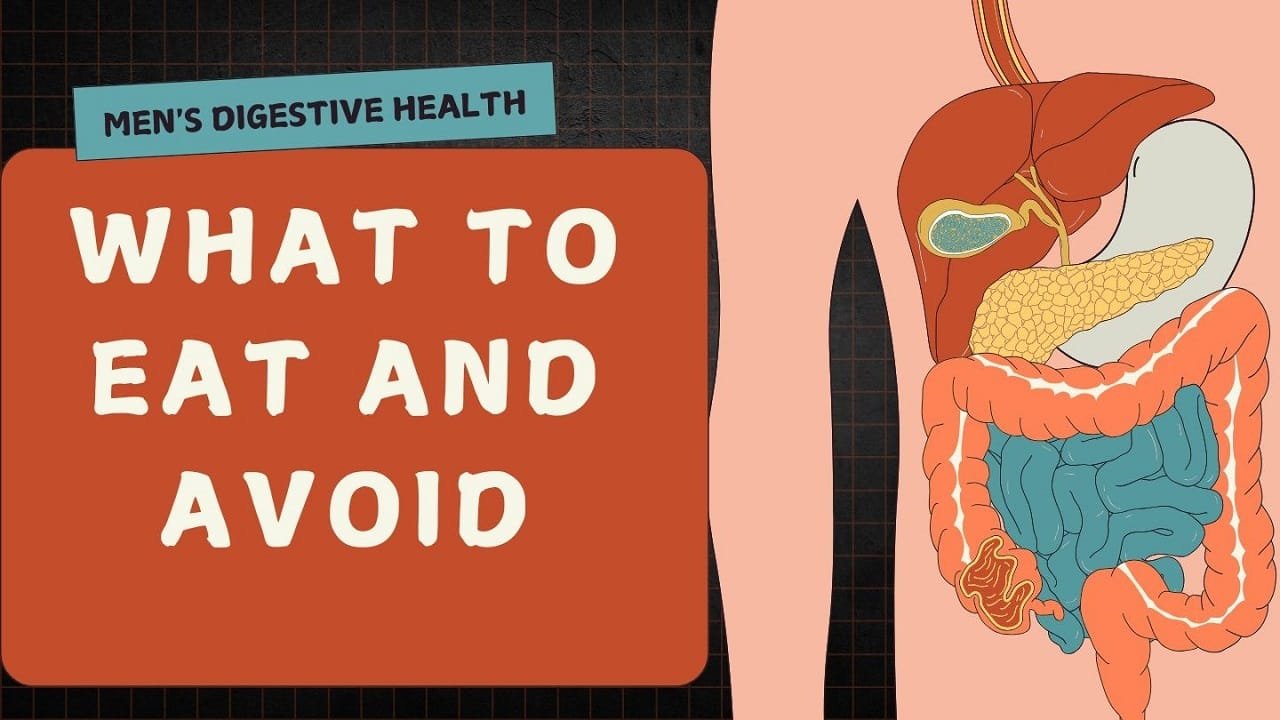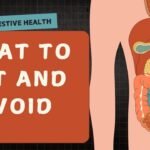Introduction:
Digestive health | Have you ever found yourself experiencing constipation or diarrhea, pain in the abdomen with abdominal distention? If so, you’re not alone. Digestive health problems are common among men and the problem impacts their routine activities and health. No one wants stomach discomfort, and it is just as important for feeling energetic and being able to focus. Your digestive system will not work well when there is an imbalance, such that you are open for mild to severe complications.
As promised in the previous blog post, this piece of writing will focus on realistic modifications to your diet plan that may boost your gut health. There is information on what you should be eating and what you should be avoiding and other aspects of a healthy gut. By the end of the guide, therefore, you will be in a position to change your life for the better by having an action plan on how to improve your digestion as well as your overall health.
1: Understanding Digestive Health:
What is Digestive Health?
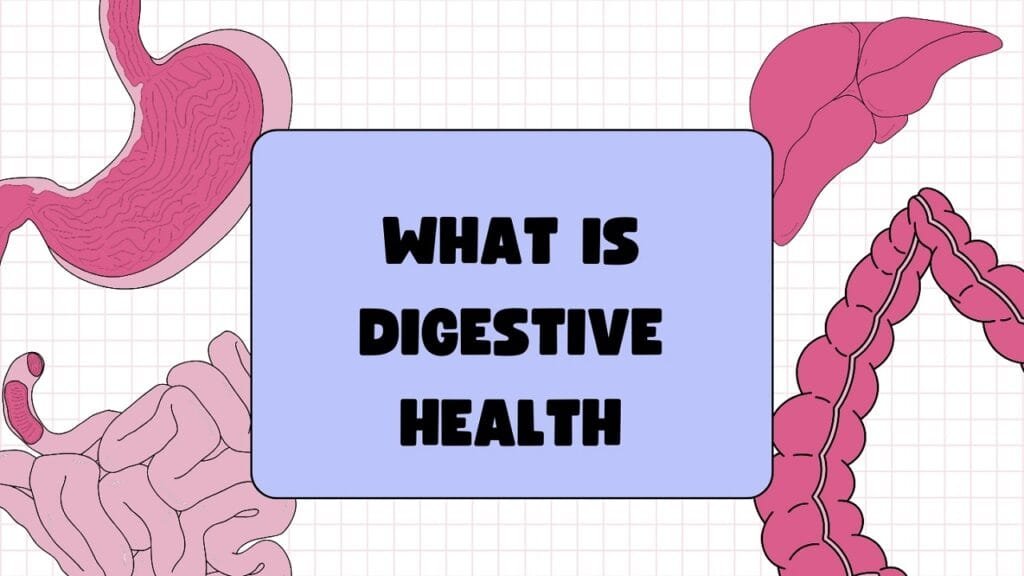
Digestive health therefore is well-being of the alimentary canal and the organs that support its functions of digestion of food and nutrient absorption and discharge of waste products. Proper digestive tract plays vital role in health and well-being; energy, immunity and other aspects fall directly under it’s influence.
Digestive Disorders Of Men:
Men often experience specific digestive issues, including:
- Bloating: A condition of bloating or swelling of the stomach.
- Constipation: Constipation or bowel movement difficulty.
- Irritable Bowel Syndrome (IBS): A disease that leads to stomach aches,pain, bloated abdomen, and irregular bowel movement.
- Acid Reflux: A condition whereby stomach acids rise from the stomach into the esophagus and cause irritation.
Almost 70 million people in the United States have gastrointestinal disorders, and men are more likely to get some types of the disease, including IBS. Such issues are the basic knowledge you need to attain with regard to your digestive system health.
2: The Role of Diet in Digestive Health:
How the Diet Affect the Digestive System:
Its essential that you understand how your food habits effective your digestion. Some types of food are good for digestion while some types of food are bad for the human digestion process. For example, fibre rich meals are good for regular bowel movement while processed foods are associated with inflammation and pains.
Macronutrient Fatty Acids for Digestive Health:
- Fiber: Traits that assist upon controlling bowel movements.
- Probiotics: Supports the development of proper gut flora.
- Hydration: Necessary for the digestion of food and to avoid formation of constipation.
- Healthy Fats: Help in decreasing inflammation within the human body and improving the uptake of the nutrients by the body.
3: Foods to Eat for Optimal Digestive Health:
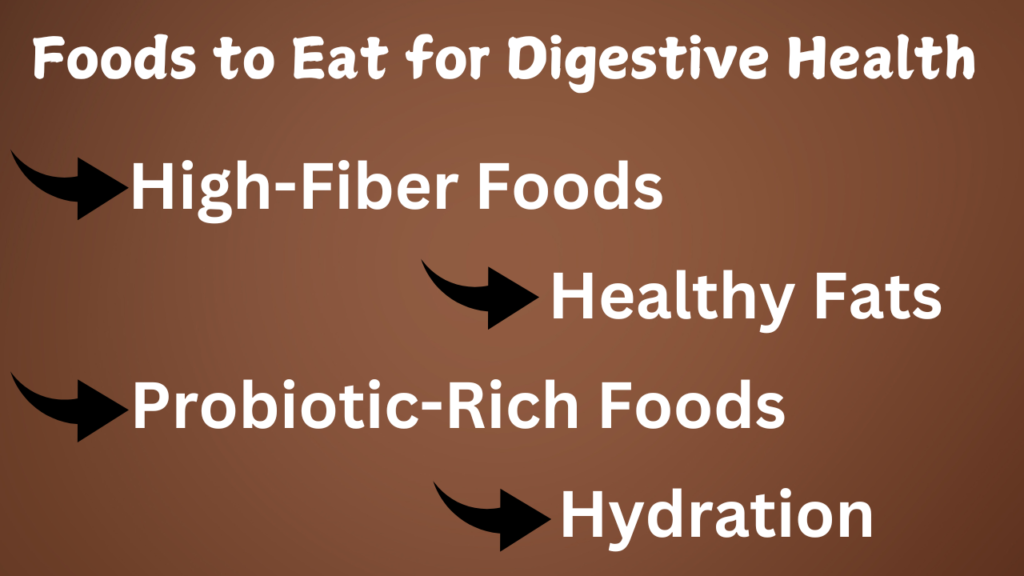
1. High-Fiber Foods
Fiber is a nutrient that has many benefits especially to the digestive system. One of the ways is by easing off constipation, the mere fact that it swells making the stool bulky is very important in maintaining efficient digestion. Ideally, the proportion of fiber should be at least between 25-30 percent of what you consume in a day. Here are some excellent sources:
- Whole Grains: Rice brown, quinoa, oatmeal, barley.
- Fruits: New Zealand Apples and pears, Scottish berries, bananas.
- Vegetables: Broccoli, carrots, greens, sweet potatoes.
- Legumes: Beans, lentil, chickpeas and black beans.
2. Probiotic-Rich Foods
Probiotics are defined as non-viable microbial cell derived from the food source that has a positive effect on host gut microbiota. Including these foods in your diet can help maintain a balanced gut flora:
- Yogurt: Always purchase live and active cultures.
- Kefir: A dairy product made from the fermentation of milk and containing active cultures of live bacteria.
- Fermented Vegetables: Cabbage fermented, korean cabbages, cucumber.
- Tempeh and Miso: Soy in its fermented form laden with good bacteria better known as probiotics.
3. Hydration
Another example of the demand for the product is that water is an essential nutrient for the digestive system. It assists in breaking of nutrients, and enhancing their absorption in the body, and last but not the least, it remains a good remedy for treating constipation. At least 8-10 glasses of water should be taken by everyone in a day. Tips for staying hydrated include:
- Carry a water bottle.
Make yourself note to take water in between the hour, especially during working hours.
Prepare those with high water content such as cabbages, watermelons and oranges.
4. Healthy Fats
Healthy fats can decrease inflammation and help the absorption of nutrients when included in the diet. Consider adding these sources to your meals:
- Avocados: contain a high level of healthy monounsaturated fats.
- Nuts and Seeds: Nut: almonds, walnut, chia seed, flax seed.
- Olive Oil: As an essential part of the Mediterranean diet people tend to associate it with certain health benefits.
4: Foods to Avoid for Better Digestive Health:
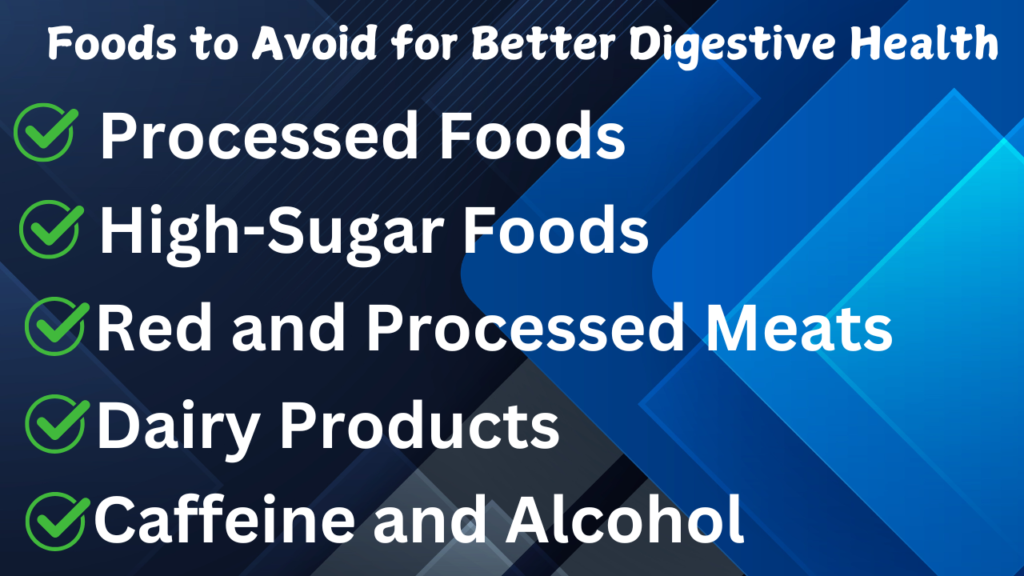
1. Processed Foods
Today’s foods are processed foods that contain many additives and preservatives and high levels of unhealthy fats that alter digestion. Common examples include:
Snack products include crisps, cookies
- Sugary cereals
- Frozen dinners
2. High-Sugar Foods
Consuming foods with high sugar content is likely to interfere with the normal functioning of gut thus the digestive problems. Limit consumption of:
- Sodas and sugary drinks
- Candy and desserts
Decadent snacks include those baked foods that contain extra sugars.
3. Red and Processed Meats
Increased intake of red and processed meats is associated with digestive tract maladies such as colorectal cancer. Consider reducing or avoiding:
- Sausages and hot dogs
- Bacon
- Deli meats
4. Dairy Products
Most male consumers are had a tendency to be lactose intolerant thus they are likely to suffer digestive complications. If you experience bloating or gas after consuming dairy, consider:
Avoiding products made from milk, cheese, and ice cream as far as possible.
Attempting new lactose-intolerant products.
5. Caffeine and Alcohol
- Caffeine and alcohol also cause irritation of the gastrointestinal tract, thereby causing difficulties such as heartburn and acid reflux. If you consume these, try to:
- Caffeine should be avoided or consumed in moderation (a cup of coffee in the morning).
Drinking alcohol should be kept to minimum or avoided completely.
5: Lifestyle Factors Impacting Digestive Health:
1. Stress Management
Stress plays a direct role in affective digestion problems. It can cause the normal bowel function of the body to go wrong and consequently lead to issues like IBS. Effective stress management techniques include:
- Exercise: Physical exercise assists decrease stress and enhances digestion of food substances in our body.
- Mindfulness Practices: Yoga and meditation could assist in clearing your mind and your body as well.
- Adequate Sleep: Sleep should be between 7 and 9 hours each night.
2. Regular Exercise
The physical activity enhances the contraction of the digestive muscles and support in maintaining the right number of carbs in the body. Half an hour of moderate intensity exercise should be done at least five times a week. Consider activities like:
- Walking or jogging
- Cycling
- Swimming
- Strength training
3. Sleep Hygiene
Proper sleep should also be supplemented as an important part of health especially when it comes to digestion. Lack of sleep also interferes with digestion. Tips for better sleep include:
- Choose a sleep and wake up time, and adhere to it, even if it’s the weekend or one is on an off duty/day off.
- Practice night time routines.
Discontinue the use of computers and other sources of light screen at least 30 minutes before sleep.
6: When to Seek Professional Help:
Identifying Aggravated Signs:
It is worth to visit a doctor when the symptoms are chronic or significant. Signs that warrant a visit include:
- Chronic pain or discomfort
- Unexplained weight loss
Note Symptons-Irritable bowel syndrome: Severe changes in bowel habits - Blood in stool
Regular Check ups:
It helps discover any problem that might be forming before it gets too far out of control. As suggested consult your physician with any issues regarding your digestion and should consider the common screenings that are usually advised.
Conclusion:
Digestive health can be enhanced and maintained should a person work hard to change his diet and habits. If you want to improve the gut health, it is pivotal to stick to the diet focusing on foods containing fibers, including probiotics, sufficient water intake, and healthy fats avoiding the products containing a lot of preservatives and sugar additives. Moreover, regular exercising, stress management and sleep are good factors which also play an important role in the digestive system.
Start making those healthy changes in your life right now – begin with assessing your diet and daily routine. Simplicity, it does not necessarily mean that it will not affect the digestive system and the total quality of life dramatically by applying small changes gradually. That is the truth behind maintaining a healthier body; a healthy gut is a healthy life.

1. What are the signs of poor digestive health?
Some of the planned indications of poor digestive health of the human body include bloating, gasses, constipation, diarrhea, stomach aches, and acid reflux. This means that if you are often facing such type of symptoms, you should definitely reconsider your eating habits and activity level.
2. How can I improve my digestive health quickly?
If you want to have a healthy digestion as soon as possible, it is important to increase fiber and water intake as well as take probiotic foods. Processed foods and stress also have to be tamed to avoid inflammation.
3. Are there specific foods that worsen digestive health?
Yes, processed foods, high-sugar foods, red and processed meats, dairy products (for those who are lactose intolerant), and excessive caffeine and alcohol can worsen digestive health.
4. How much fiber do I need for optimal digestive health?
It is recommended that most men should take fiber in a range of 25-30 grams per day for improved digestion. Intintaking fruits, vegetables, whole grain products and legumes you can be able to achieve this goal.
5. Can stress really affect my digestive health?
Absolutely. Stress can disrupt normal digestive function and exacerbate issues like IBS. Practicing stress management techniques can positively impact your digestive health.
